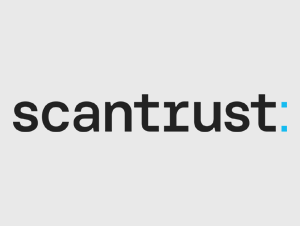ScanTrust, a smart packaging solutions company, today announced a new authentication solution utilizing its secure QR codes digitally-printed on HP Indigo to help brands and industrial companies track and trace goods to combat counterfeiting, and enable supply chain traceability.
Unilever and ScanTrust hosted a two-day activity, or track, at the Strike2Summit to discuss concepts for creating food provenance transparency in the food industry. Strike2Summit is a new conference in Amsterdam for industry leaders, start-ups, investors, governments, and civil society to collaborate with digital solutions that are building circular, sustainable, and future-proof industries. You can watch a video summarizing the event right here:
The summit was structured into three tracks at the Consumer Trust Event:
- Food Safety
- Food Quality
- Food Circularity
The track 2, “Food Quality” event was co-hosted and co-organized by Unilever and ScanTrust.
Input, Inspiration, and Discussions: Day 1 at Strike2Sutmmit
The first day for the Food Quality track was about inspiring the participants toward creative blockchain-based solutions for food provenance. Toward that inspiration, ScanTrust and Unilever presented a project that tracks the source of pork meat ingredients for a Knorr Vietnam product – a food provenance project that is live and functioning now. The ScanTrust app allows a consumer to scan a unique ScanTrust QR code on Knorr soup packs to learn about:
1) What farm the ingredients come from
2) When the pig was slaughtered and processed
3) When the soup product was made and packaged
4) Related product information
This project is an important case study and was the ideal encouragement for all participants in the Food Quality track at Strike2Summit because it shows that we’ve moved on from the proof-of-concept stage to a live blockchain solution in the food industry. Millions of Vietnamese consumers have been able to scan Knorr soup packs with the ScanTrust Knorr app giving them instant access to the entire provenance history of their soup ingredients.
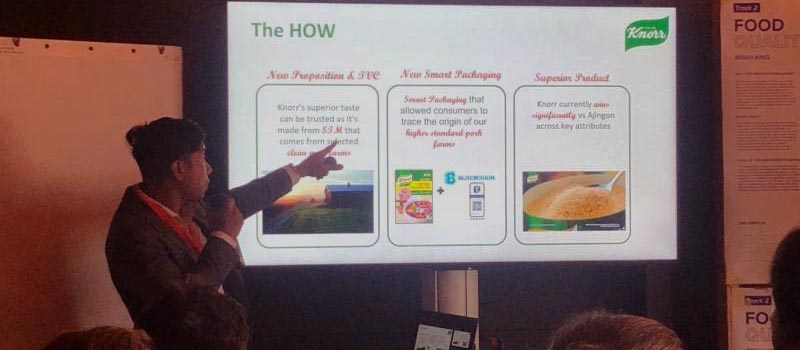
Phuong Nham, Global Brand Manager at Unilever presenting the Knorr case study
The ensuing discussion and Q&A session was intense and fortunately productive. Some of the questions discussed were:
- What is the exact value that blockchain adds to the project?
- How do we ensure data integrity and quality?
- How frequently are consumers scanning QR codes?
- What are plans to roll-out the solution to other markets?
These led into the panel discussion, including experts from Nutreco and BlockchainNL, that focused on how to increase adoption of blockchain-based food quality solutions.
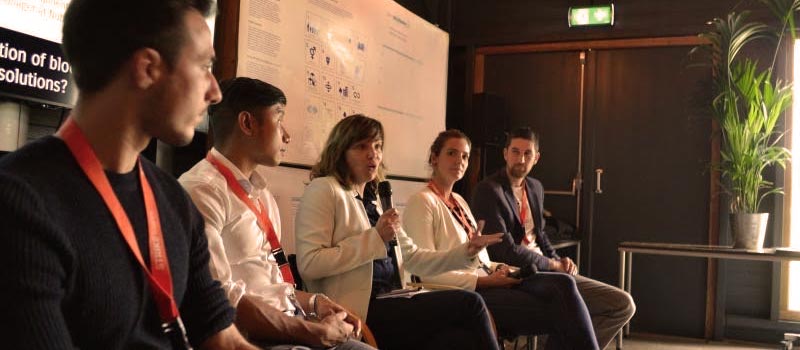
Impressions from the panel discussion. ScanTrust SA head of partnerships Ricardo Garcia is seen far left with ScanTrust CEO Nathan J. Anderson and the other panelists from Unilever, Nutreco, and BlockchainNL
Challenges naturally came from the panelists as well. How do farmers benefit from consumer food provenance solutions? How can we scale the Knorr case study to other markets and brands? What hurdles prevent further adoption of more blockchain-based food provenance solutions? Just about every track participant had their own opinions to contribute around food quality and proposed solutions. That was after all, the point. With the use-case providing a tangible starting point as an important reminder that blockchain food quality solutions at scale are already a reality, the goal was, and continues to be, moving on to the next project and the next implementation.
The panel discussion wrapped up the inspirational segment of the “Food Quality” track. Next up was joint analysis on how to solve the main challenges that were encountered with the ScanTrust Knorr app:
- The Knorr provenance data came from a relatively small, local Vietnamese supply chain. Rolling out the same solution on a larger scale will require many more suppliers working together. How can this be achieved? How can we convince disparate suppliers to join a blockchain network?
- Smart packaging is, admittedly, in its infancy in Europe, though growing in adoption. What needs to be done to increase the percentage of European consumers interacting with their product packages, namely scanning QR codes?
Track participants set about the task of preparing a convincing pitch to give the track organizers. The “solution market”, an open area at the conference,where different providers where exhibiting their solutions, was one source of solutions that was fair play, but the heavy lifting needed to come from the creativity among the group members. After 2 hours of preparation, the ideas were pitched and the jury deliberated to choose which three concepts would be brought over to the day 2 activity.
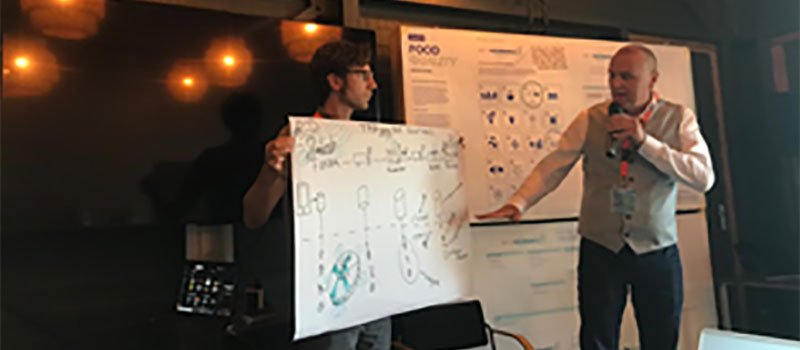
Track participants pitching their ideas to the audience
After long debates, the jury reached a conclusion and selected the three ideas that were going to be further explored the next day. The three concepts were:
- Traseable: a fisheries traceability application
- Agtrace: a farm to fork blockchain traceability solution for agricultural production
- Farmforce: a sustainable sourcing digitization concept for improving farmers’ quality of life
Finally, the Food Quality track ambition was defined as, “By 2050, Consumers will have full transparency regarding product provenance and impact of their purchases to be able to make fully independent product choices.” This meant affecting Sustainable Development Goals for:
- No poverty
- Zero hunger
- Good health and well-being
- Responsible consumption & production
- Life below water
The Ecosystem Canvas; Brainstorming and Ideation: Day 2 at Strike2Summit
The second day was designed as an ideation and brainstorming session for new business and ecosystem models based on the previous day’s winning concepts. The discussion was guided by a structured framework called the “ecosystem canvas”, a paradigm developed specifically for the Strike2Summit by the Ace Incubator team.
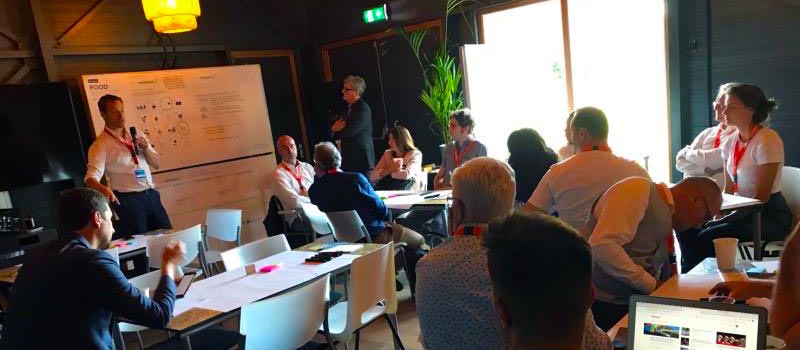
Introducing the “ecosystem canvas” overview
Several hours were spent discussing, analyzing, and churning out business and ecosystem models for tracking fish, meat, and other agricultural products. With that completed, it was time to take the pitches to the judges, it was time for the “Food Quality” track to make one last combined effort before diving into the shark tank of food experts, investors, and corporates that would determine which track out of the three, Food Safety, Food Quality, or Food Circularity, held the most promise.
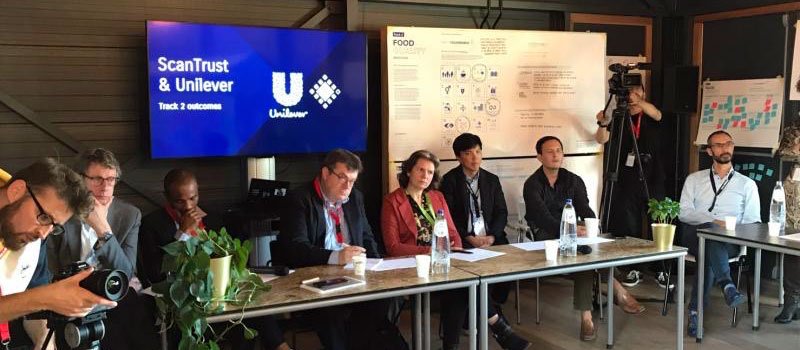
The vicious shark tank “sharks”, poised to shred apart the pitches
In the end, the Food Quality track came out ahead. Our Food Quality track was rewarded for the effort and dedication to finding a compelling solution set. After two days of working together, ScanTrust, Unilever, and our participating track members went home with the win for the track challenge.
As you might imagine, the post-win cocktails were especially sweet for our team and the remaining time at Strike2Summit was pleasantly peppered with continued discussions, new connections, and positive reflection what the event meant for the future.
Conclusion
The Strike2Summit left us with a few key takeaways:
- The food industry is under pressure from consumers to reveal food provenance. Legacy solutions just don’t cut mustard any more – brands need to get ahead of this using new technologies
- Realizing transparency models demands a multi-stakeholder approach, the participation of all supply chain actors
- Quality solution providers are not in any shortage. Technology has advanced rapidly yet industries need to be bolder and embrace the move beyond proof-of-concept to realize applications that solve real challenges
ScanTrust is contributing to the future of food. We are empowering consumers with a way to know where their food is coming from and most importantly we are in high gear to work with brands to port their own business goals into the demands of consumers.
Are ScanTrust solutions in the food industry interesting to you? Our team is available at your convenience for free, live demonstrations of ScanTrust smart packaging services. Schedule a demo or send an email to info@scantrust.com and let’s talk about how we can build solutions together. We’re looking forward to it.

